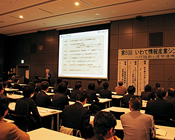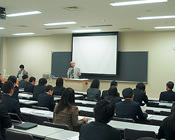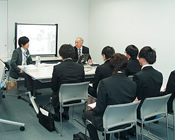As the 5th year of the first 6-year phase since the University was reorganized as a public university corporation, the 2009 academic year saw the implementation of an interim evaluation of our progress in achieving the midterm goals and a review of the direction of the university’s operations management leading up to the next phase’s midterm goals and midterm plan, along with focusing on the following 5 points to achieve the midterm goals.
1. Further Enhancement of Educational Capabilities
We worked to improve the educational outcome by establishing an integrated education system from matriculation to graduation, enhancing the level of education to foster both a wide range of knowledge and highly specialized skills, and enhancing the substantiation of credits and classroom improvement.
●Enhancement of the Iwate 5 Universities Credit Transfer System
We took the lead in considering the possibility of implementing the “Local Human Resource Development Course (Iwate Studies)” as a new credit transfer system based upon the “Strategic University Partnership Support Project”. This course will be offered starting from the 2010 academic year.
|
||
|
●Enhancement of the Academic Functions of the Media Center
While we still continue to collect the research papers, etc. that were published internally, we are planning to publish the collected research bulletins electronically using the CiNii (Citation Information from the National Institute of Informatics) system by the end of October, 2010.
In terms of library usage, materials and facility environment, we set up venues for the exchange of opinions between students and the Head of the Media Center, and also issued a call for requests for library materials on the part of the students and set up a system by which these would be displayed in the newly-arrived books section.
 |
 |
|
Working to Set Up a Corner for Introducing Books |
||
●Educational Support through the Use of Technology
Based on the considerations undertaken by the “Expert Committee on the Furthering of Instruction and FD” and the “Expert Committee on Student Support”, we have elected to introduce the “Class Support System” and the “Student Chart System”.
●Approval for the Certified Nurse Specialist in Cancer Nursing Course
The “Certified Nurse Specialist Course in Cancer Nursing” in the Graduate School of Nursing has been approved, and we have been able to certify 3 Certified Nurse Specialist courses.
2. Research Activities that Tackle Local Issues
We worked on developing a system to grasp the issues accurately, strengthening practical measures to handle the issues, developing a system for making recommendations and policy suggestions, and taking an active approach in publically announcing our research results.
●Working to Put the Results of Our Research to Practical Use in Community Activities
We hosted the “2009 Regional Development and Regional Contribution Seminar and Presentation”, and an event titled “Designing Regional Development through Workshops” was took place at the Regional Development Research Institute as a collaborative effort between the Student Volunteer Center and the Regional Action Research Committee.
We hosted a presentation for the results of researches carried out at the Kanegasaki Campus of the Regional Development University, and, along with the Faculty of Policy Studies’ Public Policy Course held at the Research Institute for Public Policy, the results of work undertaken at the Regional Development University and a poster display were presented at the “30th Anniversary Celebration of the Declaration of Kanegasaki as a Town for Life-Long Learning” sponsored by the town of Kanegasaki.
In terms of other endeavors, we have set up a homepage for the “IPU Community Planning Plaza”, jointly hosted a presentation on the results of research undertaken by the Morioka City Community Planning Institute, presented the results of research conducted under the general themes of building emotional and physical health and public welfare, hosted a presentation on activities undertaken by the students of the Prefectural University, and brought in new academic research funds to tackle local issues.
 |
 |
|
Activities report by students (March 27, at the Aiina Center) |
||
●Reviewing the Structure of Interdisciplinary and Cross-Sectional Research
We have continued with the implementation of “Establishing a Distance Education System for Regional Professionals and Practical Research”, and drew up a report on the results of the “Research Aimed at Supporting the Recuperation and Quality of Life of Cancer Patients, as well as their Fulfillment and Equality”.
In addition, the “Iwate Prefecture Manufacturing Software Amalgamated Technology Center (provisional name)”, which is an industry-university-government collaborative research project that was proposed by our university, Iwate Prefecture, and the industrial community, has been adopted by JST and will be fully implemented starting from the 2011 academic year.
●Promoting Learning that Improves Specialized Knowledge
We have offered diverse learning opportunities, such as community college workshops, placements for care worker and social workers in the Nishiwaga region, and so on. In addition, we have launched a “Nishiwaga Project” within the Faculty, and put on a “Nishiwaga Movie Presentation and Symposium” during the university festival. (Faculty of Social Welfare)
●Promotion of Interactions between the University, Business and the Community
By hosting the 5th Iwate Information Industry Symposium, Capital Region Business Career-Search Forum, and the Sendai Business Career-Search Forum, we were able to achieve active interactions between the business sector of various regions and the University. (Faculty of Software and Information Science)
 |
 |
 |
||
Iwate Information |
Capital Region Business |
Sendai Business |
3. Building a Strong Relationship with Iwate’s secondary schools
We have worked to strengthen our connections to Iwate’s secondary schools through activities to raise junior and senior high school students’ interest in academics. We have also worked to facilitate the communications with Iwate’s secondary schools, and improved our system for accepting students who are a good match for our education as well as the joint projects between secondary schools and the University.
●Support for Students who Find it Difficult to Attend School
In addition to having expanded the tuition waiver eligibility from the 2009 academic year, we have also implemented tuition waivers for students affected by storm or flood damage or by the death of the household’s primary income earner, and provided these students with financial aid.
●Review of Entrance Exam Questions, Interviews, and Evaluative Procedures
We provided instructions to those faculty members in charge of carrying out interviews and engaged in exchanges of opinions with them. “Comprehensive questions” have been discarded and a new point allocation system is under consideration, and we are planning to reconsider the AO entrance exams in future as well. (Faculty of Nursing)
●Rethinking the Entrance Exam System for Admissions Based Upon Recommendation
The results of the analysis of the 2009 academic year entrance exam have been reflected in the drafting of questions for the 2010 academic year entrance exam for recommendation-based applicants. We also sought out feedback from Iwate’s secondary schools in order to put together the upcoming proposal for changing the entrance exam system for admissions based upon recommendation. (School of Software and Information Science).
●Strengthening Ties with Secondary Schools
We welcomed visits to the campus, including on Saturdays and Sundays, implemented “Campus Observation Days” and “School Information Sessions” new initiative. As a means to build linkages between the University and secondary schools, we also implemented, pre-admission education on a trial basis for those who had passed the recommendation based entrance exam. (Miyako College)
4. Maintaining a High Employment Rate Even During Economic Downturn
We have worked to foster career-oriented minds, to provide an efficient and effective job-search environment, to find new potential employers and promote a mutual understanding between the University and potential employers, and to encourage graduates to settle in Iwate,
●Promoting Practical Learning and Hands-on Expertise
With the revised curriculum, “Research Into Local Industry and Business” was established as an elective course starting from the 2009 academic year, which was designated as a requirement for graduation along with the other specialization courses. (Faculty of Policy Studies)
●Internships Assistance
We conducted a questionnaire survey of the internship situations in junior colleges both within and outside Iwate prefecture. Almost all of our students (76) participated in the information sessions on internship options, and of these 46 students took part in internship. (Morioka Junior College)
●Introduction of Career Education
Career education aimed at fostering an awareness of available career path and what can/should be done in the future was implemented through introductory seminars and basic research from the first term of the first year. Education in the Information Section saw the implementation of informational literacy education in basic research, along with the establishment of a framework to allow for the taking of the Personal Computer Proficiency Test Association’s “P-Test” at our university. (Miyako College)
5. Drastic Strengthening of the Promotion of Educational and Research Activities
We have worked to optimize the university’s operations, developed a systematic environment for conducting educational and research activities, and improved the motivation to promote educational and research activities.
●Improving Research Ethics
The Research Ethics Review Board met once a month as a general rule, and reviewed 35 cases over the course of one year. In order to prevent improprieties in research activities, we clarified and disseminated information on the procedures to be undertaken to ensure the proper use of research funds in accordance with the Plan for the Prevention of Improprieties established in March, 2009.
●Working to Set Out the Next Phase’s Midterm goals and Midterm Plans
The performance evaluation to be carried out at the 4-year mark of the midterm target period (the interim evaluation) was undertaken, and based on the results, we put together a basic plan aimed at developing key regional human resources and generating a sense of action in the local areas as the next phase’s midterm goals and Midterm Plans.

